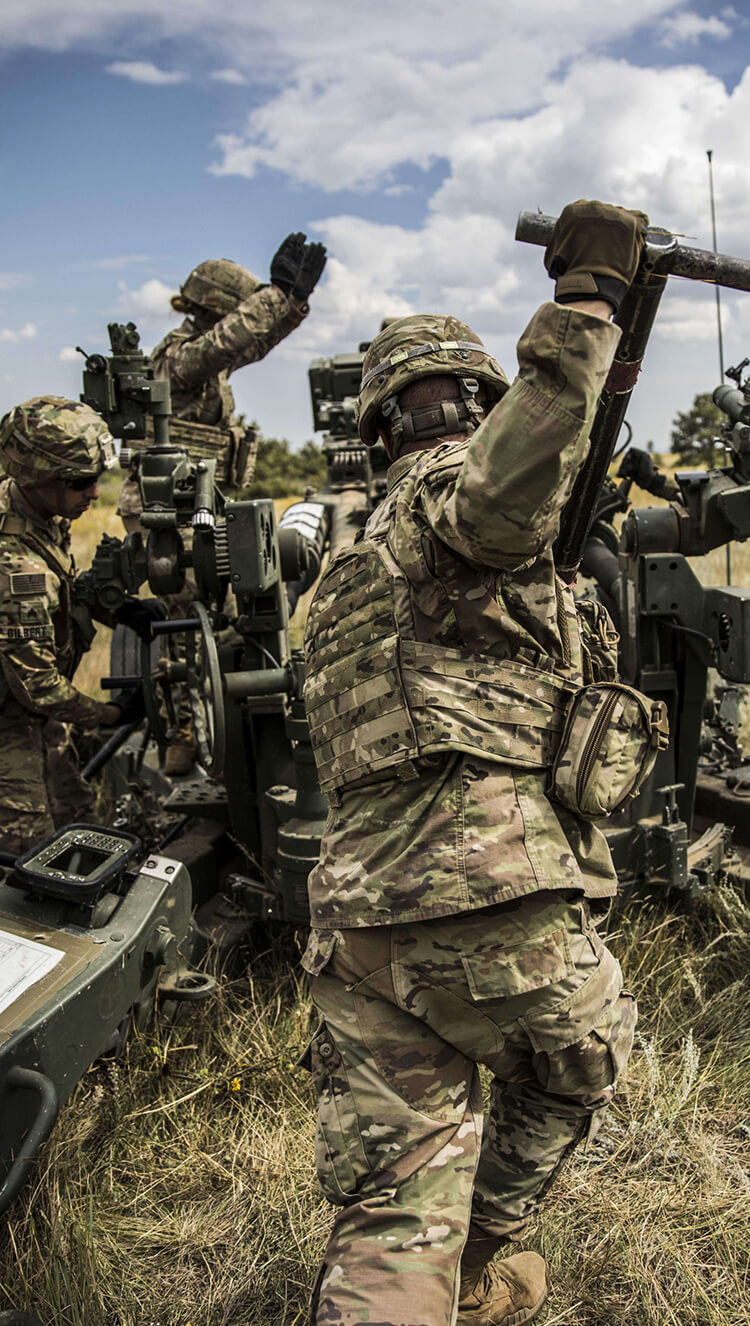
A Less Expensive Education
We’ll help pay for your education so you can pursue the career you want.
Find Personal Success
Through Flexibility
While many Soldiers choose to attend traditional four-year colleges, the Army also pays for a variety of programs, training courses, and schools, like:
-
Online School
-
Online courses and degree programs provide flexibility for Soldiers’ varying schedules. Thousands of single parents and even deployed members earn their college degrees each year using online education.
Most schools offer online programs that range from associate to master’s degrees and, depending on the course, may take as little as one to two hours a day, three days a week.
-
Full-Time School
-
You can choose to serve part-time in the Army while you go to college. Many Soldiers take advantage of this unique opportunity to get career training, train a weekend a month and two weeks a year, and earn money while getting their degree.
-
Entrepreneurship Training
-
Transitioning service members and their spouses can take advantage of Boots to Business (B2B), an entrepreneurial education and training program that provides participants with an overview of business ownership and applicable business ownership fundamentals.
-
Licensing & Certification Courses
-
As part of the Army Credentialing Opportunities Online (Army COOL) service, the Army Credentialing Assistance (CA) program provides qualifying Soldiers with up to $4,000 per fiscal year in career educational benefits.
The CA program allows Soldiers to earn professional and technical credentials and enhance their skills while serving and increasing their overall employability when transitioning from the Army.
Explore a Less Expensive Education
- Experience: 1 YR
- Contract Length: 4 YRS
- Rank: Private First Class
- Career: Human Intelligence Collector
- Experience: 1 YR
- Contract Length: 4 YRS
- Rank: Private First Class
- Career: Human Intelligence Collector
- Time: 1 WKND/Month + 2WK/Year
- Experience: 1 YR
- Contract Length: 4 YRS
- Rank: Private First Class
- Career: Human Intelligence Collector
- Experience: 1 YR
- Contract Length: 4 YRS
- Rank: Private First Class
- Career: Human Intelligence Collector
- Time: 1 WKND/Month + 2WK/Year
Education
(In Progress)
Education
(In Progress)

Learn on the Job
In addition to being able to continue school, you’ll also learn while you serve. You’ll receive hands-on job training, access to leadership courses, valuable skills and mentorship, and a number of other educational opportunities to continue growing and shaping the career you want to have.
Serve Your Way and Get an Education for Less
Talk to your local recruiter to get the full details.
Thanks for reaching out,
Questions you may have right now
- Who will reach out to me?
One of our recruiters will either call or email you to set up time to talk.
- Who will reach out to me?
One of our ROTC recruiters will either call or email you to set up time to talk.
- What will you ask me?
Our conversation will likely begin with some basic qualifying questions, like your age and education level. From there, the conversation will be about getting to know you and your goals for the future. Expect us to ask about your interests and skills so we can suggest Army jobs that might interest you.
- How can I prepare for the conversation?
-
While we'll ask you questions, this is your opportunity to ask some of your own. Here are a couple to get you started:
How can the Army help me pay for college?
Do I have to go to Basic Training?
- How can I prepare for the conversation?
-
While we'll ask you questions, this is your opportunity to ask some of your own. Here are a couple to get you started:
How can the Army help me pay for college?
What is the time commitment for part-time service?
- How can I prepare for the conversation?
-
While we'll ask you questions, this is your opportunity to ask some of your own. Here are a couple to get you started:
Can the Army help me pay for medical school?
Do I have to go to Basic Training?
- How can I prepare for the conversation?
-
While we'll ask you questions, this is your opportunity to ask some of your own. Here are a couple to get you started:
How do I apply for ROTC scholarships?
How do I join ROTC at the college I want to attend?
- Will I be expected to join if I talk to someone?
No. Our goal is to answer your questions and help you decide if the Army is a good option for you. We understand you may not be ready to join yet, or that we may not be the right fit, and that's fine. There's no obligation for talking to us.
KEEP EXPLORING
Explore more topics that may interest you
Thanks for reaching out,
Questions you may have right now
- Who will reach out to me?
One of our recruiters will either call or email you to set up time to talk.
- What will you ask me?
Our conversation will likely begin with some basic qualifying questions, like your age and education level. From there, the conversation will be about getting to know you and your goals for the future. Expect us to ask about your interests and skills so we can suggest Army jobs that might interest you.
- How can I prepare for the conversation?
-
While we'll ask you questions, this is your opportunity to ask some of your own. Here are a couple to get you started:
Do I qualify to join the Army?
Can I join as an Officer?
- How can I prepare for the conversation?
-
While we'll ask you questions, this is your opportunity to ask some of your own. Here are a couple to get you started:
Do I qualify to join the Army?
Can I join as an Officer?
- How can I prepare for the conversation?
-
While we'll ask you questions, this is your opportunity to ask some of your own. Here are a couple to get you started:
What type of health care jobs are available in the Army?
Can the Army help me pay for medical school?
- How can I prepare for the conversation?
-
While we'll ask you questions, this is your opportunity to ask some of your own. Here are a couple to get you started:
Can I join ROTC at my age
Can I join as an Officer?
- Will I be expected to join if I talk to someone?
No. Our goal is to answer your questions and help you decide if the Army is a good option for you. We understand you may not be ready to join yet, or that we may not be the right fit, and that's fine. There's no obligation for talking to us.
KEEP EXPLORING
Explore more topics that may interest you
Thanks for reaching out, .
We admire you for considering such a big career decision at your age. Unfortunately, we're unable to directly reach out to you until you are at least sixteen years old and a junior in high school. However, the following ROTC info is something that may interest you now.
Questions you may have right now
- How old do I have to be to serve in the Army full-time?
To become an enlisted Soldier, you must be 17 years old. To become an Army Officer, you must be at least 18 years old and have a college degree obtained either through ROTC, U.S. Military Academy at West Point, or from another college or university program. Learn more about Army Eligibility Requirements and how to receive Officer training while in college.
- How can the Army help me pay for college?
There are a variety of options available to help you pursue education with flexibility, such as ROTC programs, the GI Bill, and other programs that help pay for college tuition, trade school, technical school, or trainings. View all of the Education Benefits available to you
- How do I apply for ROTC Scholarships?
Army ROTC has several scholarships available for college-bound high school students. Review your options at ROTC Scholarships, or immediately apply by creating an account at my.goarmy.com to get started.
- How old do I have to be to serve in the Army part-time?
To become an enlisted Soldier, you must be 17 years old. To become an Army Officer, you must be at least 18 years old and have a college degree obtained either through ROTC, U.S. Military Academy at West Point, or from another college or university program. Learn more about Army Eligibility Requirements and how to receive Officer training while in college.
- What are the ways to serve part-time?
You can serve part-time as a Soldier in the Army Reserve or the Army National Guard. By serving part-time, you are able to continue your college education or work a civilian job, while earning an extra paycheck and maintaining many of the benefits of military service.
- How can the Army help me pay for college?
There are a variety of options available to help you pursue education with flexibility, such as ROTC programs, the GI Bill, and other programs that help pay for college tuition, trade school, technical school, or trainings. View all of the Education Benefits available to you.
- How do I become a health care provider in the Army?
You can serve part-time or full-time as you train in our health care program. Upon graduation of the program, you will enter the Army health care team as a Commissioned Officer.
- What types of medical careers are available in the Army?
There are numerous health care careers available through the Army Medical Education Deparment (AMEDD), including physicians, dentists, nurses, veterinarians, and many more. View your career options.
- How can the Army help me pay for college?
There are a variety of options available to help you pursue education with flexibility, such as ROTC programs, the GI Bill, and other programs that help pay for college tuition, trade school, technical school, or trainings. View all of the Education Benefits available to you.
- What are the benefits of joining ROTC?
ROTC makes it possible to achieve your ambitions. Become a leader and serve your country in one of the nation's top leadership training programs. You can do this while maintaining your college curriculum and earning up to 100% tuition coverage. Upon graduation, you're guaranteed a career as an Army Officer.
- How do I prepare to join ROTC?
When you're at least 16 years old and at least a high school junior, you can reach out to us, or even talk to your high school counselor. Together, we'll talk options and decide if ROTC is the right path for you.
- Will I become an Officer if I complete ROTC?
Yes. After graduation, you are commissioned as a highly respected second lieutenant in the Army, entrusted with leading other Soldiers.
KEEP EXPLORING
Explore more topics that may interest you
Curious what career is best for you?
Discover opportunities you never knew existed with Army Career Match.
[The Army] has really helped me fulfill everything I wanted to do as far as my education goes. They helped me pay for college... they give me money for tuition, and I also get money through the GI Bill.- Sgt. Kristen King, U.S. Army Reserve

Other Benefits You Can Expect From a Career in the Army
-
See Details
Skills & Training
Become a more desirable employee
-
See Details
Money & Pay
Keep your full paycheck
-
See Details
Health care
Get quality coverage at little to no cost
-
See Details
Enlistment Bonuses
Make more money quickly
-
See Details
Total Benefits
Get the complete package
